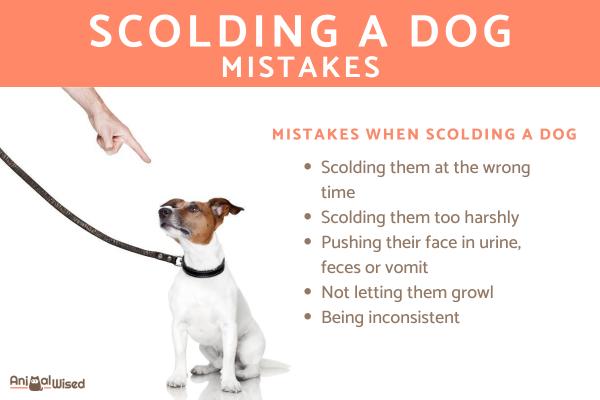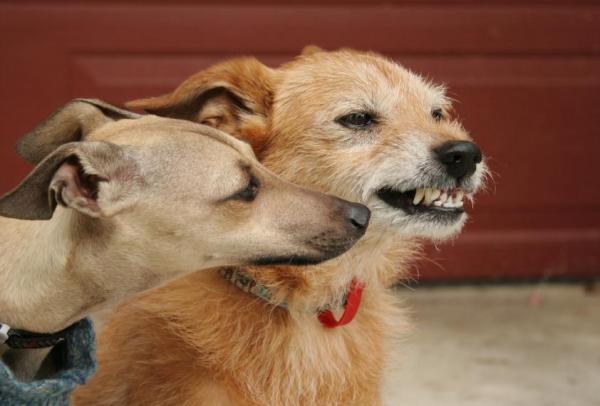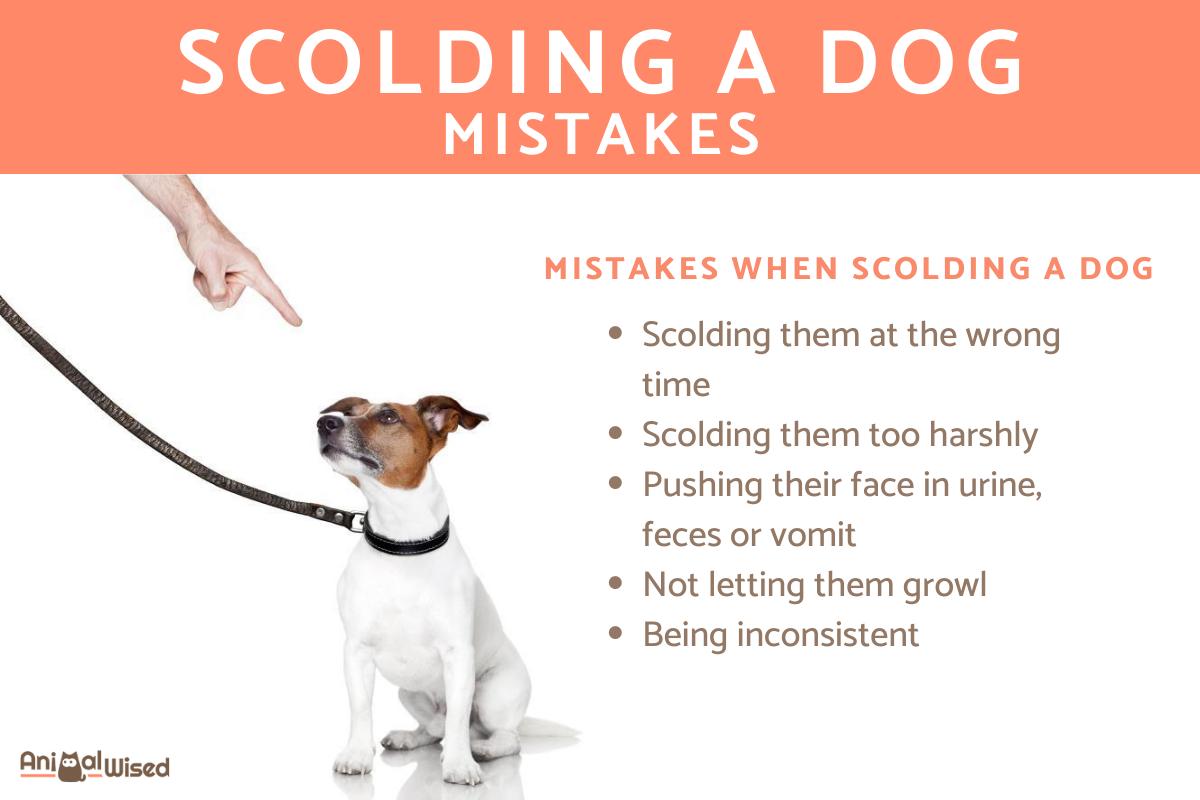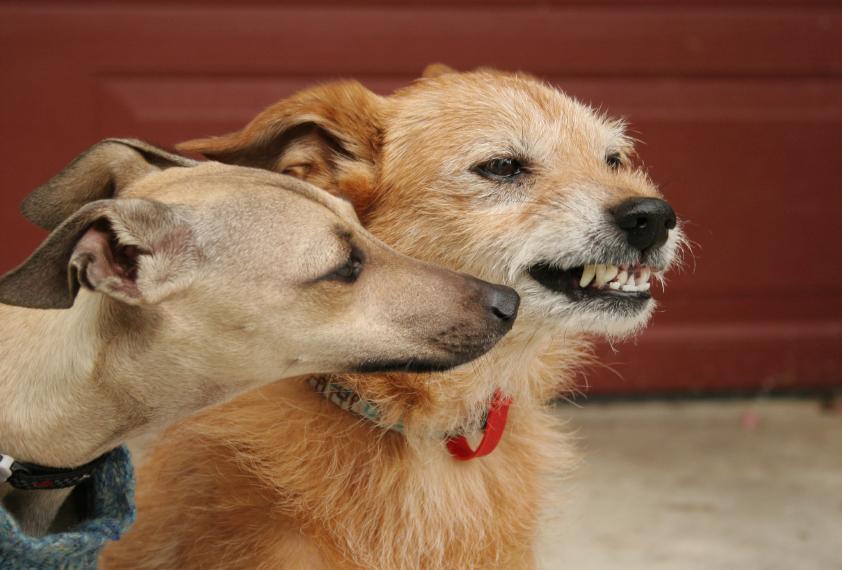Common Mistakes When Scolding a Dog



See files for Dogs
Scolding a dog refers to the act of reprimanding or chastising a dog for inappropriate behavior. It is a form of verbal correction used by dog owners or trainers to discourage behaviors that are considered undesirable or unacceptable. Scolding typically involves using a firm tone of voice and specific verbal cues to communicate disapproval or displeasure to the dog. Unfortunately, many guardians use scolding improperly and can cause serious behavioral problems in their dog.
At AnimalWised, we look at how we can avoid this in our dog with the most common mistakes when scolding a dog. We look at what behaviors we need to avoid and what effects they can have on a scolded dog.
What is scolding a dog?
Scolding is a form of negative reinforcement in dogs. Since dogs and humans do not communicate in the same way, we need to find ways to let dogs know their mistakes and set up our boundaries. Scolding is a verbal form of correction, meaning a guardian will say something to the dog when they do something deemed undesirable. The dog does not understand the language being used, but they can understand what the guardian is trying to say.
The purpose of scolding is to provide immediate feedback to the dog, helping them understand that their behavior is unwanted. It aims to discourage actions such as excessive barking, jumping on people, chewing on furniture or engaging in aggressive behavior. By scolding, dog owners aim to establish boundaries and teach their pets what is acceptable and what is not.
While scolding can be an effective way to discourage unwanted behavior, it is essential to use it sparingly and appropriately. Overusing scolding or employing harsh methods can have negative consequences, such as fear or anxiety in dogs. It is crucial to combine scolding with positive reinforcement and reward-based training methods to encourage desired behaviors in dogs.
With this context in mind, we look at the most common mistakes made when scolding a dog:
1. Scolding your dog at the wrong time
Scolding a dog after the fact can be harmful to them for several reasons. Firstly, dogs have a limited ability to make connections between their actions and the consequences when there is a significant time gap. If you scold a dog long after the undesirable behavior occurred, they may not understand why they are being reprimanded. This can lead to confusion and anxiety in the dog, as they are unsure about the cause of the scolding.
Secondly, scolding a dog after the fact can create a negative association with the owner or the environment in which the scolding occurs. The dog may start to associate your presence or certain locations with punishment, leading to fear or avoidance behaviors. This can strain the bond between you and your dog and make future training more challenging.
Lastly, dogs thrive on positive reinforcement and clear communication. By focusing on scolding after the fact, you miss the opportunity to provide immediate feedback and reinforce positive behaviors. Positive reinforcement, such as rewards and praise, is generally more effective in teaching dogs what you want them to do rather than focusing solely on what you don't want them to do.
To effectively train a dog, it is generally recommended to use positive reinforcement techniques, redirecting their behavior and addressing issues promptly using proper dog obedience training rather than relying on scolding after the fact.

2. Scolding them too harshly
When a dog is scolded too much or too harshly, several negative consequences can occur:
- Fear and anxiety: frequent or severe scolding can create a fearful and anxious environment for the dog. They may become constantly on edge, anticipating punishment even for minor mistakes. This fear and anxiety can lead to a decline in their overall wellbeing and may manifest in behaviors such as trembling, cowering, or avoidance.
- Aggression: excessive scolding can trigger fear-based aggression in dogs. If a scolded dog feels threatened or cornered due, they may resort to defensive behaviors such as growling, snapping, or biting. Aggression can escalate if the dog perceives scolding as a threat to their safety.
- Loss of trust and bonding: dogs thrive on a positive relationship with their owners, built on trust and mutual understanding. When scolding is too frequent or overly harsh, it erodes the trust between the dog and the owner. The dog may become fearful or hesitant to approach the owner, hindering the development of a strong bond.
- Inhibited learning: dogs learn best through positive reinforcement and clear communication. If scolding is the predominant form of interaction, it can inhibit the dog's ability to learn and understand what is expected of them. They may become more focused on avoiding punishment rather than learning desired behaviors.
- Behavioral issues: excessive scolding without providing alternative guidance can result in the development of new behavioral issues. The scolded dog may become frustrated, confused, or act out in other ways as they try to navigate the environment and understand what is expected of them.
It is crucial to strike a balance between correction and positive reinforcement in dog training, using gentle and consistent methods to encourage desired behaviors rather than relying solely on harsh scolding.
3. Pushing their face in urine, feces or vomit
Rubbing a dog's nose in urine, feces or vomit is an outdated and ineffective method of addressing house-training accidents or undesirable behaviors. Here's why you shouldn't engage in this practice:
- Ineffective communication: rubbing a dog's nose in urine or vomit does not effectively communicate the desired behavior to the dog. Dogs live in the present moment, and their ability to make connections between past actions and consequences is limited. By the time you discover the mess and try to correct them, the dog may not understand why they are being scolded. This can lead to confusion and anxiety rather than promoting learning.
- Negative association: associating urine or vomit with a negative experience can create an aversion or fear response in dogs. They may start to develop anxiety around eliminating or become afraid of their own bodily functions. This can lead to problems such as withholding urine or bowel movements, which can have negative health implications.
- Trust and bonding: dogs rely on trust and a positive bond with their owners for effective training and a healthy relationship. Rubbing a scolded dog's nose in urine or vomit can erode trust and damage the bond between you and your pet. The dog may associate you with punishment, leading to avoidance behaviors or fear-based reactions. This can hinder their ability to learn and inhibit their overall wellbeing. Abused dogs are particularly sensitive. You can learn how to build an abused dog's trust in our related article.
- Stress and anxiety: dogs are sensitive creatures, and harsh methods like rubbing their nose in urine or vomit can cause stress and anxiety. These negative emotions can lead to various behavioral issues such as increased fearfulness, aggression, or withdrawal. A stressed dog is less likely to learn and respond positively to training efforts.
- Positive reinforcement: effective dog training relies on positive reinforcement rather than punishment. Positive reinforcement involves rewarding desired behaviors instead of focusing solely on correcting unwanted actions. By rewarding a dog for eliminating in the appropriate area or displaying good behavior, you create a positive association and motivation for them to continue those behaviors.
In summary, rubbing a dog's nose in urine, feces or vomit is counterproductive and potentially harmful. It fails to effectively communicate the desired behavior, can create negative associations and fear, damages trust and bonding, and increases stress and anxiety in dogs. It is best to employ positive reinforcement techniques and focus on redirecting behavior to promote successful house-training and overall positive behavior in dogs.
When a dog has already been house trained, but starts defecating inappropriately, it means there is a problem that needs to be addressed. Learn what to do with our article on why is my dog pooping in the house all of a sudden?
4. Not letting them growl
Scolding a dog for growling can have also detrimental effects on their behavior and emotional wellbeing. Growling is a crucial communication tool for dogs, indicating their discomfort or unease in a particular situation. When a dog is scolded for growling, several negative consequences can occur. In addition to the previously explained issues with developing anxiety, losing trust and provoking aggressive behavior, it can greatly harm our communication.
Growling serves as a warning signal that a dog is feeling threatened, fearful or uncomfortable. By scolding a dog for growling, you are essentially punishing them for expressing their discomfort. This can lead to the dog suppressing their warning signals, which increases the risk of escalation to more aggressive behaviors. Without the ability to communicate their discomfort through growling, a dog may resort to biting or other aggressive responses without prior warning.
Generally speaking, scolding a is a negative form of communication. In order for our dog to live happily, they need to express themselves. Scolding a dog for expressing themselves in a healthy way will only force them to do so in unhealthy ways. It can harm the bond between the scolded dog and all other members of the family, whether human or animal.
This does not mean a dog should growl all the time. When a dog growls at inappropriate times, then we need to address this behavior. Learn more with our article on why does my dog growl at me?

5. Being inconsistent
Being inconsistent when scolding a dog can create confusion and hinder effective training. Here's why inconsistency is problematic:
- Lack of clarity: dogs thrive on clear and consistent communication. When scolding a dog, inconsistency in your tone, timing or reactions can send mixed signals. A scolded dog may struggle to understand what behavior is truly undesirable, as the consequences vary depending on the situation. Inconsistent scolding can lead to confusion, making it challenging for the dog to learn and modify their behavior accordingly.
- Reinforces unwanted behavior: inconsistency can inadvertently reinforce unwanted behavior. For example, if you scold a dog for jumping on you one day and then allow them to do so the next, they may become confused about what is acceptable. They may continue engaging in the unwanted behavior, hoping for a different outcome based on previous inconsistent responses. Inconsistency can undermine the training process by unintentionally rewarding the very behavior you're trying to discourage.
- Frustration and insecurity: dogs are intelligent animals that seek stability and predictability. Inconsistent scolding can lead to frustration and insecurity in dogs. They may become unsure about what is expected of them and may develop anxiety or stress as a result. Inconsistency can erode their confidence and hinder their ability to learn and respond appropriately.
- Reinforces negative associations: when scolding is inconsistent, dogs may associate certain actions or cues with punishment unpredictably. This can lead to negative associations with specific environments, people or objects, causing fear or avoidance behaviors. The dog may become anxious or hesitant in situations that were previously neutral or positive due to the unpredictable scolding they have experienced.
- Damages trust and bonding: consistency is a fundamental aspect of building trust and strengthening the bond between a dog and its owner. Inconsistent scolding can erode trust and damage the relationship. Dogs may become unsure or apprehensive around their owners, affecting the overall dynamics and hindering effective training and communication.
To ensure effective training and a healthy relationship with your dog, it is crucial to be consistent in your scolding and overall approach to discipline. Establish clear rules and expectations, provide consistent feedback and reinforce positive behaviors consistently. Consistency helps dogs understand boundaries, reduces confusion and promotes a secure and trusting environment for learning and growth.

If you want to read similar articles to Common Mistakes When Scolding a Dog, we recommend you visit our Basic education category.







